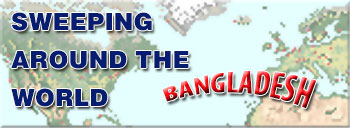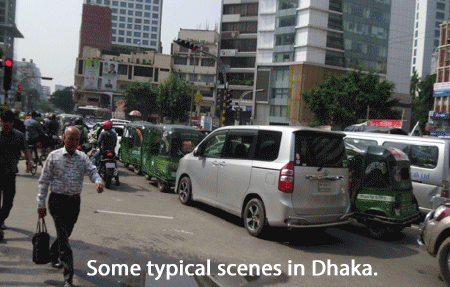Sweeping in Bangladesh

Sweeping in Bangladesh |
 |
Sweeping in Dhaka, BangladeshBangladesh is both an old and a new country. Jammed between India and Myanmar at the top of the Bay of Bengal, the country has a history stretching back 4,000 years.
by Phileas Fogg 
Dhaka, the bustling Bangladesh capital city of around 20 million people, sits on the wide, flood-prone Ganges River delta and is the fourth most densely populated city in the world. Bursting at the seams, the city never seems to stop with traffic consisting of cars, trucks, buses, motorbikes, auto-rickshaws and good old-fashioned pedal rickshaws. All of them are equipped with a horn or bell, which is used incessantly. The noise is deafening and, of course, none of the drivers seems to take any notice. There is no chance of sweeping any of the streets during the daytime, there is hardly enough room for the traffic, let alone any form of sweeping.
The simple solution is to sweep manually at night. Just in Dhaka North 4,000 hand broom sweeper personnel are sent out each night. These good folks, about 50/50 men and women, walk to their designated streets from small depots scattered throughout the city. They are armed with a whisk broom, shovel and, in some cases, a small wheelbarrow. All this seems very basic, but overall the city streets were relatively free of litter and looked reasonably clean. I have certainly seen dirtier streets in so called "first world" cities. The manual workers sweep debris into piles in the gutter, which are then loaded manually into a tip truck for removal.
The sweepers work is made all the more difficult by the building construction taking place all over the city. During the process, sand and building materials are dumped in piles on the roadway and in gutters. Sometimes the material will stay there on and off for years, not only making sweeping impossible but allowing material to virtually pour into the storm drain system. Bangladesh, like all of that part of the world, suffers from massive rainfall during the monsoon season with flash flooding common.
Commodore Razzak has started to experiment with mechanized sweeping and has installed one Johnston vacuum sweeper in North Dhaka. So far it has been used on some main roads and its performance and daily loads carefully monitored. He showed me interesting figures of loads collected that spiked alarmingly when strong westerly winds blew and shifted fine sand and silt onto the road.
The answer will be to re-deploy them into areas that do not receive any sweeping at all. The waste management departments on both sides of the city are continually looking for better ways to keep their city clean but in a country with very limited budget it is difficult to justify large capital expenditure when so many other infrastructure projects are in need of funds. Fortunately both ends of Dhaka can see the need to improve street sweeping and management will continue to search for solutions. I look forward to watching their progress.
|